 W
WAachen, also known as Bad Aachen, in Dutch as Aken, in French as Aix-la-Chapelle, in Italian as Aquisgrana, and in Latin as Aquæ Granni, is a spa and border city in North Rhine-Westphalia, Germany. Aachen developed from a Roman settlement and spa, subsequently becoming the preferred medieval Imperial residence of Emperor Charlemagne of the Frankish Empire, and, from 936 to 1531, the place where 31 Holy Roman Emperors were crowned Kings of the Germans.
 W
WAbul-Abbas was an Asian elephant brought back to Carolingian emperor Charlemagne by his diplomat Isaac the Jew. The gift was from the Abbasid caliph Harun al-Rashid and symbolizes the beginning of Abbasid–Carolingian relations. The elephant's name and events from his life are recorded in the Carolingian Annales regni Francorum, and he is mentioned in Einhard's Vita Karoli Magni. However, no references to the gift or to interactions with Charlemagne have been found in Abbasid records.
 W
WAlcina is an opera seria by George Frideric Handel. Handel used the libretto of L'isola di Alcina, an opera that was set in 1728 in Rome by Riccardo Broschi, which he acquired the year after during his travels in Italy. Partly altered for better conformity, the story was originally taken from Ludovico Ariosto's Orlando furioso, an epic poem. The opera contains several musical sequences with opportunity for dance: these were composed for dancer Marie Sallé.
 W
WAngelica is a princess in the epic poem Orlando innamorato by Matteo Maria Boiardo. She reappears in the saga's continuation, Orlando furioso by Ludovico Ariosto, and in various later works based on the two original Orlando pieces. The narratives are part of the Matter of France, a cycle of legendary history stories based on the adventures of Charlemagne and his paladins.
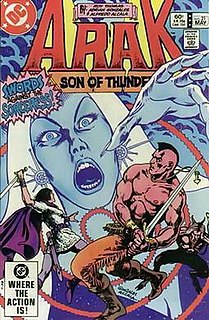 W
WArak is a fictional comic book character and a superhero published by DC Comics. He first appeared in a special insert in The Warlord #48 and was created by Roy Thomas and Ernie Colón.
 W
WAriodante is an opera seria in three acts by George Frideric Handel. The anonymous Italian libretto was based on a work by Antonio Salvi, which in turn was adapted from Canti 4, 5 and 6 of Ludovico Ariosto's Orlando Furioso. Each act contains opportunities for dance, originally composed for dancer Marie Sallé and her company.
 W
WAstolfo is a fictional character of the Matter of France where he is one of Charlemagne's paladins. He is the son of Otto, the King of England, and is a cousin to Orlando and Rinaldo, and a descendant of Charles Martel. While Astolfo's name appeared in the Old French chanson de geste The Four Sons of Aymon, his first major appearance was in the anonymous early fourteenth-century Franco-Venetian epic poem La Prise de Pampelune. He was subsequently a major character in Italian Renaissance romance epics, such as Morgante by Luigi Pulci, Orlando Innamorato by Matteo Maria Boiardo, and Orlando Furioso by Ludovico Ariosto.
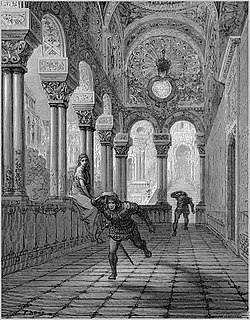 W
WAtlantes was a powerful sorcerer featured in chansons de geste. In Boiardo's Orlando Innamorato (1482), where he is known as Atalante, the magician fears that Rugiero will convert to Christianity and aid Charlemagne against the Saracens. To prevent this and forestall Rugiero's death, he constructs a magic garden ringed by glass on Mt. Carena in the Atlas Mountains, after which he is named. In Orlando Furioso, Atlantes' magical castle is filled with illusions, in order to divert Ruggiero from what he has foretold as certain doom. Ruggiero is later set free by Bradamante and after numerous trials and quests sires a great line of heroes. He later dies betrayed fulfilling the destiny foretold by Atlantes.
 W
WThe Battle of Roncevaux Pass in 778 saw a large force of Basques ambush a part of Charlemagne's army in Roncevaux Pass, a high mountain pass in the Pyrenees on the present border between France and Spain, after his invasion of the Iberian Peninsula.
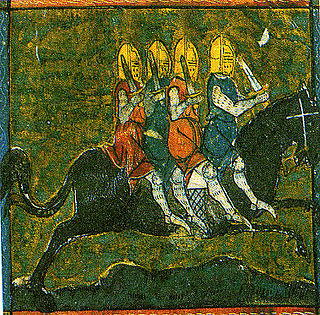 W
WBayard is a magic bay horse in the legends derived from the chansons de geste. He is renowned for his spirit, and possesses the supernatural ability to adjust his size to his riders.
 W
WBevis of Hampton or Sir Bevois, was a legendary English hero and the subject of Anglo-Norman, Dutch, French, English, Venetian, and other medieval metrical romances that bear his name. The tale also exists in medieval prose, with translations to Romanian, Russian, Dutch, Irish, Welsh, Old Norse and Yiddish.
 W
WThe Castle of Iron is the title of a fantasy novella by American authors L. Sprague de Camp and Fletcher Pratt, and of the novel into which it was later expanded by the same authors. It was the third story in their Harold Shea series. As a 35,000 word novella it was first published in the fantasy magazine Unknown for April, 1941. The revised and expanded novel version was first published in hardcover by Gnome Press in 1950, and in paperback by Pyramid Books in 1962. The book has been reprinted by a number of other publishers since its first appearance. An E-book edition was published by Gollancz's SF Gateway imprint on September 29, 2011 as part of a general release of de Camp's works in electronic form. The novel has been combined with other books in the series in the omnibus editions The Compleat Enchanter (1975), The Complete Compleat Enchanter (1989) and The Mathematics of Magic: The Enchanter Stories of L. Sprague de Camp and Fletcher Pratt (2007). It has also been translated into Italian.
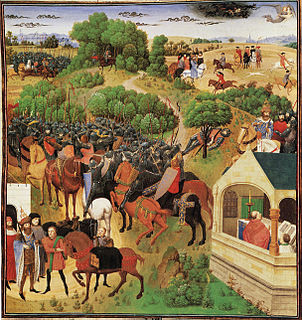 W
WThe chanson de geste is a medieval narrative, a type of epic poem that appears at the dawn of French literature. The earliest known poems of this genre date from the late eleventh and early twelfth centuries, before the emergence of the lyric poetry of the trouvères (troubadours) and the earliest verse romances. They reached their highest point of acceptance in the period 1150–1250.
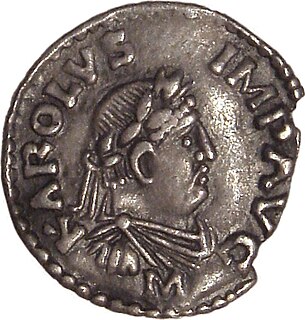 W
WCharlemagne or Charles the Great, numbered Charles I, was the King of the Franks from 768, the King of the Lombards from 774, and the Emperor of the Romans from 800. During the Early Middle Ages, he united the majority of western and central Europe. He was the first recognised emperor to rule from western Europe since the fall of the Western Roman Empire around three centuries earlier. The expanded Frankish state that Charlemagne founded is called the Carolingian Empire. He was later canonised by Antipope Paschal III.
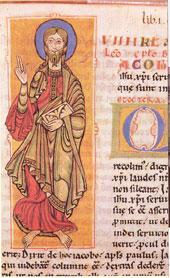 W
WThe Codex Calixtinus is the main witness for the 12th-century Liber Sancti Jacobi, or the Book of Saint James. It is a pseudepigraph attributed to Pope Callixtus II; its principal author or compilator is referred to as "Pseudo-Callixtus", often identified with French scholar Aymeric Picaud. Its most likely date of compilation is the period of 1138–1145.
 W
WFerragut was a character—a Saracen paladin, sometimes depicted as a giant—in texts dealing with the Matter of France, including the Historia Caroli Magni, and Italian romantic epics, such as Orlando innamorato by Matteo Maria Boiardo and Orlando furioso by Ludovico Ariosto. In the tales, he was portrayed as physically invulnerable except at his navel/stomach, and was eventually killed by the paladin Roland.
 W
WFierabras or Ferumbras is a fictional Saracen knight appearing in several chansons de geste and other material relating to the Matter of France. He is the son of Balan, king of Spain, and is frequently shown in conflict with Roland and the Twelve Peers, especially Oliver, whose prowess he almost rivals. Fierabras eventually converts to Christianity and fights for Charlemagne.
 W
WFierrabras, D 796, is a three-act German opera with spoken dialogue written by the composer Franz Schubert in 1823, to a libretto by Joseph Kupelwieser, the general manager of the Theater am Kärntnertor. Along with the earlier Alfonso und Estrella, composed in 1822, it marks Schubert's attempt to compose grand Romantic opera in German, departing from the Singspiel tradition.
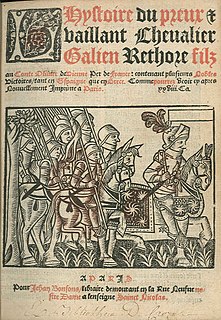 W
WGaliens li Restorés, or Galien le Restoré or Galien rhétoré, is an Old French chanson de geste which borrows heavily from chivalric romance. Its composition dates anywhere from the end of the twelfth century to the middle of the fourteenth century. Five versions of the tale are extant, dating from the fifteenth century to the sixteenth century, one in verse and the others in prose. The story—which is closely linked to the earlier chansons de geste Pèlerinage de Charlemagne and The Song of Roland —tells of the adventures of Galien, son of the hero Olivier and of Jacqueline, the daughter of the (fictional) emperor Hugon of Constantinople.
 W
WIn the Matter of France, Ganelon is the knight who betrayed Charlemagne's army to the Saracens, leading to the Battle of Roncevaux Pass. His name is said to derive from the Italian word inganno, meaning fraud or deception. He is based upon the historical Wenilo, the archbishop of Sens who betrayed King Charles the Bald in 858.
 W
WGirart de Roussillon, also called Girard, Gérard II, Gyrart de Vienne, and Girart de Fraite, was a Burgundian chief who became Count of Paris in 837, and embraced the cause of Lothair I against Charles the Bald. He was a son of Leuthard I, Count of Fézensac and of Paris, and his wife Grimildis.
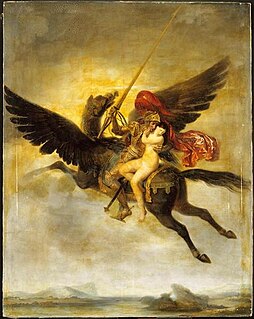 W
WThe hippogriff, or sometimes spelled hippogryph, is a legendary creature with the front half of an eagle and the hind half of a horse.
 W
WMaugris or Maugis was one of the heroes of the chansons de geste and romances of chivalry and the Matter of France that tell of the legendary court of King Charlemagne. Maugis was cousin to Renaud de Montauban and his brothers, son of Beuves of Aygremont and brother to Vivien de Monbranc. He was brought up by Oriande the fairy, and became a great enchanter. He won the magical horse Bayard and the sword Froberge which he later gave to Renaud.
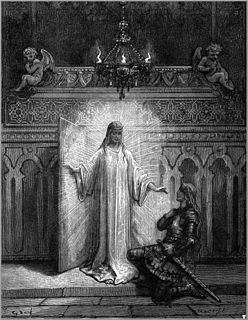 W
WMelissa is a fictional good sorceress in the Matter of France. She is said to have been an apprentice of Merlin and guards his tomb, though she does not appear in older stories about him.
 W
WMontjoie Saint Denis! was the battle cry and motto of the Kingdom of France.
 W
WMorgan le Fay, alternatively known as Morgan[n]a, Morgain[a/e], Morg[a]ne, Morgant[e], Morge[i]n, and Morgue[in] among other names and spellings, is a powerful enchantress in the Arthurian legend. Early appearances of Morgan do not elaborate her character beyond her role as a goddess, a fay, a witch, or a sorceress, generally benevolent and related to King Arthur as his magical saviour and protector. Her prominence increased over time, as did her moral ambivalence, and in some texts there is an evolutionary transformation of her to an antagonist, particularly as portrayed in cyclical prose such as the Lancelot-Grail and the Post-Vulgate Cycle. A significant aspect in many of Morgan's medieval and later iterations is the unpredictable duality of her nature, with potential for both good and evil.
 W
WThe Nonexistent Knight is an allegorical fantasy novel by Italian writer Italo Calvino, first published in Italian in 1959 and in English translation in 1962.
 W
WOberon is a king of the fairies in medieval and Renaissance literature. He is best known as a character in William Shakespeare's play A Midsummer Night's Dream, in which he is King of the Fairies and spouse of Titania, Queen of the Fairies.
 W
WOgier the Dane is a legendary knight of Charlemagne who appears in many Old French chansons de geste. In particular, he features as the protagonist in La Chevalerie Ogier, which belongs to the Geste de Doon de Mayence. The first part of this epic, the enfance[s] of Ogier, is marked by his duel against a Saracen from whom he obtains the sword Cortain, followed by victory over another Saracen opponent from whom he wins the horse Broiefort. In subsequent parts, Ogier turns into a rebel with cause, seeking refuge with the King of Lombardy and warring with Charlemagne for many years, until he is eventually reconciled when a dire need for him emerges after another Saracen incursion.
 W
WOlifant was the name applied in the Middle Ages to ivory hunting horns made from elephants' tusks. One of the most famous olifants belonged to the legendary Frankish knight Roland, protagonist of The Song of Roland.
 W
WOrlando finto pazzo is an opera in three acts composed by Antonio Vivaldi to a libretto by Grazio Braccioli. The plot is based on an episode in Matteo Boiardo's unfinished epic poem Orlando Innamorato. The second of Vivaldi's known operas, Orlando finto pazzo premiered in November 1714 at the Teatro Sant'Angelo in Venice. Vivaldi acted as impresario as well as composer. Apparently the opera did not meet much approval from the audience and was billed only on few dates, just to be replaced, on 1 December, by a reworking of Giovanni Alberto Ristori’s Orlando furioso, an opera that the Vivaldi "impresa" had very successfully staged in 1713.
 W
WOrlando furioso is an Italian epic poem by Ludovico Ariosto which has exerted a wide influence on later culture. The earliest version appeared in 1516, although the poem was not published in its complete form until 1532. Orlando Furioso is a continuation of Matteo Maria Boiardo's unfinished romance Orlando Innamorato. In its historical setting and characters, it shares some features with the Old French Chanson de Roland of the eleventh century, which tells of the death of Roland. The story is also a chivalric romance which stemmed from a tradition beginning in the late Middle Ages and continuing in popularity in the 16th century and well into the 17th.
 W
WOrlando, usually known in modern times as Orlando furioso, is an opera in three acts by Antonio Vivaldi to an Italian libretto by Grazio Braccioli, based on Ludovico Ariosto's epic poem Orlando Furioso. The first performance of the opera was at the Teatro San Angelo, Venice, in November 1727. It is to be distinguished from an earlier Vivaldi opera of 1714, Orlando furioso, set to much the same libretto, once thought to be a revival of a 1713 opera by Giovanni Alberto Ristori but now considered by Vivaldian musicologists to be a fully-fledged opera by Vivaldi himself.
 W
WOrlando Innamorato is an epic poem written by the Italian Renaissance author Matteo Maria Boiardo. The poem is a romance concerning the heroic knight Orlando (Roland). It was published between 1483 and 1495.
 W
WThe paladins are twelve fictional knights of legend, the foremost members of Charlemagne's court in the 8th century. They first appear in the mediaeval chanson de geste cycle of the Matter of France, where they play a similar role to the Knights of the Round Table in Arthurian romance. In these romantic portrayals, the chivalric paladins represent Christianity against a Saracen (Muslim) invasion of Europe. The names of the paladins vary between sources, but there are always twelve of them led by Roland. The paladins' most influential appearance is in The Song of Roland, written between 1050 and 1115, which narrates the heroic death of Roland at the Battle of Roncevaux Pass.
 W
WRenaud de Montauban was a fictional hero and knight who was introduced to literature in a 12th-century Old French chanson de geste known as Les Quatre Fils Aymon. The four sons of Duke Aymon are Renaud, Richard, Alard, and Guiscard, and their cousin is the magician Maugris. Renaud possesses the magical horse Bayard and the sword Froberge.
 W
WRodomonte is a major character in the Italian romantic epic poems Orlando innamorato by Matteo Maria Boiardo and Orlando furioso by Ludovico Ariosto. He is the King of Sarza and Algiers and the leader of the Saracen army which besieges Charlemagne in Paris. He is in love with Doralice, Princess of Granada, but she elopes with his rival Mandricardo. He tries to seduce Isabella but she tricks him into killing her by mistake. In remorse, Rodomonte builds a bridge in her memory and forces all who cross it to pay tribute. When the "naked and mad" Orlando arrives at the bridge, it is Rodomonte, the pagan, who throws him into the river below. They both swim ashore, but Orlando who is naked and is unimpeded by heavy armors get to the shore first. Finally, Rodomonte appears at the wedding of Bradamante and Ruggiero and accuses Ruggiero of treason for converting to Christianity and abandoning the Saracen cause. The two fight a duel and Rodomonte is killed.
 W
WRoland was a Frankish military leader under Charlemagne who became one of the principal figures in the literary cycle known as the Matter of France. The historical Roland was military governor of the Breton March, responsible for defending Francia's frontier against the Bretons. His only historical attestation is in Einhard's Vita Karoli Magni, which notes he was part of the Frankish rearguard killed in retribution by the Basques in Iberia at the Battle of Roncevaux Pass.
 W
WThe Song of Roland is an 11th-century epic poem based on the Battle of Roncevaux Pass in 778, during the reign of Charlemagne. It is the oldest surviving major work of French literature and exists in various manuscript versions, which testify to its enormous and enduring popularity in the 12th to 16th centuries.
 W
WThree Hearts and Three Lions is a 1961 fantasy novel by American writer Poul Anderson, expanded from a 1953 novella by Anderson which appeared in Fantasy & Science Fiction.
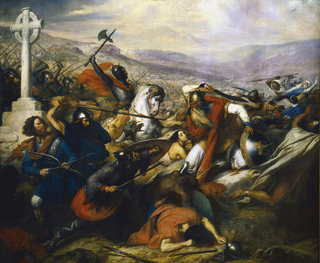 W
WThe Battle of Tours, also called the Battle of Poitiers and, by Arab sources, the Battle of the Highway of the Martyrs, was fought on 10 October 732, and was an important battle during the Umayyad invasion of Gaul. It resulted in victory by the Frankish and Aquitainian forces under Charles Martel over the Umayyad Caliphate led by Abdul Rahman Al Ghafiqi, Governor-General of al-Andalus.
 W
WValentine and Orson is a romance which has been attached to the Carolingian cycle.